Acls strokes - Study guides, Class notes & Summaries
Looking for the best study guides, study notes and summaries about Acls strokes? On this page you'll find 74 study documents about Acls strokes.
Page 2 out of 74 results
Sort by

-
ACLS and Strokes Quizzes & answers 100% correct 2024
- Exam (elaborations) • 34 pages • 2024
-
- $17.49
- + learn more
Which is the recommended first intravenous dose of amiodarone for a patient with refractory ventricular fibrillation? A. 100mg B. 150mg C. 250mg D. 300mg correct answersD Which is the recommended next step after a defibrillation attempt? A. Check the ECG for evidence of a rhythm B. Open the patient's airway C. Determine if a carotid pulse is present D. Resume CPR, starting with chest compressions correct answersD Which best describes the length of time it should take to perform a ...

-
ACLS CERTIFICATION EXAM `& VERIFIED ANSWERS | LATEST UPDATE | RATED 100%
- Exam (elaborations) • 30 pages • 2024
- Available in package deal
-
- $13.49
- + learn more
Any organized rhythm without a pulse is defined as pulseless electrical activity (PEA). ANSWER: True Synchronized cardioversion is appropriate for treating an unknown wide complex tachycardia. ANSWER: True The aorta is the wall that separates the ventricles of the heart. ANSWER: False The most effective treatment for ventricular fibrillation is defibrillation. ANSWER: True An individual should be cleared-Ñ prior to a shock only when convenient. ANSWER: False PEA and asysto...
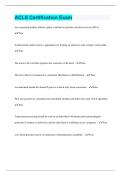
-
ACLS Certification Exam
- Exam (elaborations) • 22 pages • 2024
-
Available in package deal
-
- $9.99
- + learn more
ACLS Certification Exam Any organized rhythm without a pulse is defined as pulseless electrical activity (PEA). - True Synchronized cardioversion is appropriate for treating an unknown wide complex tachycardia. - True The aorta is the wall that separates the ventricles of the heart. - False The most effective treatment for ventricular fibrillation is defibrillation. - True An individual should be cleared-Ñ prior to a shock only when convenient. - False PEA and asystole are c...
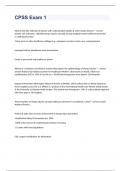
-
package deal for CPSS TEST 2023/2024 PASSED
- Package deal • 19 items • 2023
-
- $45.49
- + learn more
1 Exam (elaborations) ACLS Strokes questions with complete solutions 2023/2024 passed 2 Exam (elaborations) Ch 1 Performance Dimensions-CPSS questions n answers graded A+ 3 Exam (elaborations) Ch2 Training Load Model-CPSS questions and answers graded A+ 2023/2024 4 Exam (elaborations) CPSS Ophthalmic Facilities and Equipment Basic Training 2023/
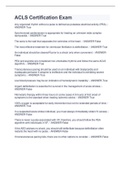
-
ACLS Certification Exam WITH QUESTIONS AND ANSWERS 2022
- Exam (elaborations) • 12 pages • 2022
- Available in package deal
-
- $11.99
- 1x sold
- + learn more
Any organized rhythm without a pulse is defined as pulseless electrical activity (PEA). - ANSWER-True Synchronized cardioversion is appropriate for treating an unknown wide complex tachycardia. - ANSWER-True The aorta is the wall that separates the ventricles of the heart. - ANSWER-False The most effective treatment for ventricular fibrillation is defibrillation. - ANSWER-True An individual should be cleared-Ñ prior to a shock only when convenient. - ANSWERFalse PEA and asystole are cons...
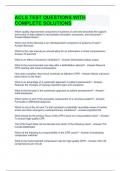
-
ACLS TEST QUESTIONS WITH COMPLETE SOLUTIONS
- Exam (elaborations) • 4 pages • 2024
- Available in package deal
-
- $10.49
- + learn more
ACLS TEST QUESTIONS WITH COMPLETE SOLUTIONS What is one major sign of a patient having a stroke? - Answer-Facial droop What are the major types of strokes? - Answer-Ischemic and hemorrhagic What is the most common type of stroke? - Answer-Ischemic What stroke screen was used in the stroke video? - Answer-CPSS Which is a sign or symptom of a stroke - Answer-Trouble speaking Why is it important for EMS personnel to alert the receiving facility stroke team as soon as possible? -...
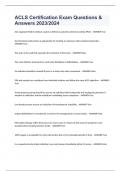
-
ACLS Certification Exam Questions & Answers 2023/2024
- Exam (elaborations) • 16 pages • 2023
-
Available in package deal
-
- $9.49
- + learn more
ACLS Certification Exam Questions & Answers 2023/2024 Any organized rhythm without a pulse is defined as pulseless electrical activity (PEA). - ANSWER-True Synchronized cardioversion is appropriate for treating an unknown wide complex tachycardia. - ANSWER-True The aorta is the wall that separates the ventricles of the heart. - ANSWER-False The most effective treatment for ventricular fibrillation is defibrillation. - ANSWER-True An individual should be cleared-Ñ prior to a shock...
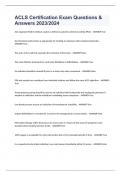
-
ACLS Certification Exam Questions & Answers 2023/2024
- Exam (elaborations) • 16 pages • 2023
-
Available in package deal
-
- $9.49
- + learn more
ACLS Certification Exam Questions & Answers 2023/2024 Any organized rhythm without a pulse is defined as pulseless electrical activity (PEA). - ANSWER-True Synchronized cardioversion is appropriate for treating an unknown wide complex tachycardia. - ANSWER-True The aorta is the wall that separates the ventricles of the heart. - ANSWER-False The most effective treatment for ventricular fibrillation is defibrillation. - ANSWER-True An individual should be cleared-Ñ prior to a shock...
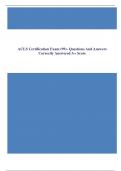
-
ACLS Certification Exam (99)- Questions And Answers Correctly Answered A+ Score
- Exam (elaborations) • 13 pages • 2024
-
- $12.98
- + learn more
ACLS Certification Exam (99)- Questions And Answers Correctly Answered A+ Score ACLS Certification Exam (99)- Questions And Answers Correctly Answered A+ Score Any organized rhythm without a pulse is defined as pulseless electrical activity (PEA). Correct ans - True Synchronized cardioversion is appropriate for treating an unknown wide complex tachycardia. Correct ans - True The aorta is the wall that separates the ventricles of the heart. Correct ans - False The most effective treatment for ven...
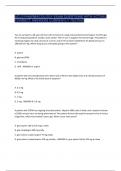
-
ACLS PHARMACOLOGY EXAM QUESTIONS WITH ACTUAL CORRECT ANSWERS CURRENTLY TESTING
- Exam (elaborations) • 6 pages • 2024
-
- $18.99
- + learn more
This text outlines a series of ACLS pharmacology exam questions and their correct answers, focusing on various clinical scenarios involving medications used during cardiac arrest, acute strokes, and arrhythmias. Key drugs discussed include aspirin, atropine, epinephrine, and amiodarone, highlighting their indications and dosages in emergency situations

How did he do that? By selling his study resources on Stuvia. Try it yourself! Discover all about earning on Stuvia


